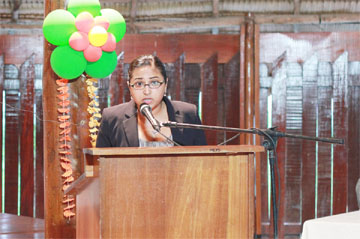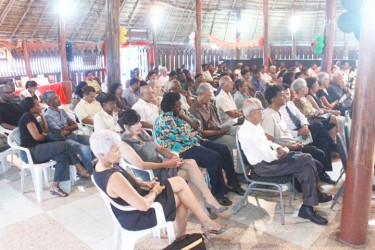Indian women who came to then British Guiana as indentured labourers experienced a transformative journey, according to American journalist and author Gaiutra Bahadur, who says they went from a community with no choice to an existence with a little choice.
Bahadur, who concluded the three-part Commemora-tive Lecture Series on the Arrival of Indians in Guyana with a presentation at Umana Yana on Tuesday night, noted that the travails of Indian women during the days of indentureship were parallel to the Hindu creation story itself, where these women were formed from the ocean and given a new life.

According to her presentation, titled “Her Middle Passage: Indian Women and the Journey of Indenture,” apart from an escape from lives that were sometimes filled with abuse and neglect, these women also found themselves with some power.
Bahadur noted that “to an extent, women during indenture possessed a greater power to remake themselves unlike men… because they were in demand as sexual partners, housekeepers, cooks and companions.” She added that this newfound power also led to jealousy in their male counterparts and the women who often married to better their circumstances suffered domestic violence as a result. She recalled many tales of women being chopped with cutlasses when husbands were suspicious of their whereabouts and behaviour were documented in newspapers.
In addition, Bahadur said the makeup of the passengers aboard the ships journeying from India included a large percentage of pregnant women and women travelling alone. She noted that on the ship her great-grandmother travelled on, 71% of the women were without husbands and 11% were pregnant (an earlier version of this news item had incorrectly reported this figure as 70%). Single women, she said, for the first time had the ability to earn a wage and she cited many accounts of many women who saw passage and indentureship as an escape from their lives in India that were sometimes filled with abuse and neglect.
Bahadur, who is author of the book ‘Coolie Woman: The Odyssey of Indenture,’ noted that for years she rifled through ship reports, inquiries into plantation uprisings, the private dossiers of officials and newspapers to get a glimpse of what life was like for women. She travelled to India to conduct her research as well as through the Caribbean.

“These official papers, however one-sided, however incomplete, gave me glimpses into the lives of Indian women,” she noted. She, however, observed that “the archives leave gaps missing. With very few exceptions are voices of the indentured themselves. The vast majority weren’t literate in English or any Indian languages, so they didn’t leave behind diaries or letters and this applies especially to the women. They did not write down their own stories in their own words.”
Bahadur said that there was need to “interrogate the text” because Indian history was told through the eyes of those in power, with little testimony from the indentured themselves. Nevertheless, she said that even though the texts were not told through the voices of the indentured, the stories were still there. Through Guyanese folk songs, the texts and the documented history could be elaborated on, she said, while noting a song from the Calcutta depots in which indentured sang about being “disrobed and degraded” by the doctors checking them before they were loaded on to the ships for their journey to the Caribbean. She said that folksongs depict confusion and a stage where indentured were stripped of their personal belongings, including religious garb, and were instead given petticoats for their journey.
“Sometimes, I think that the women that left India as coolies kept quiet on purpose. It may be that the circumstances were too traumatic to remember, much less the reclaim. It may be that their emotions were too conflicted… perhaps language hampered them. They may have lacked the word in English to express the deep dividedness of departure to their children and their grandchildren,” Bahadur stated.









